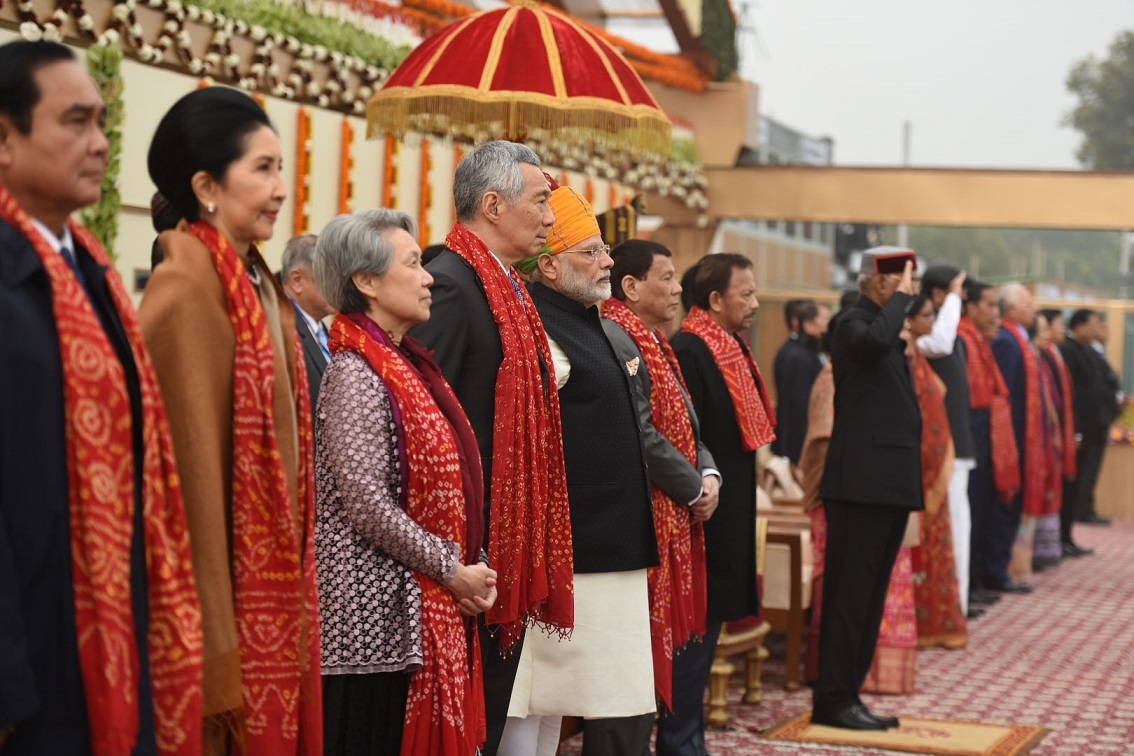
The politics of chief guests at Republic Day
While leaders of all and sundry countries have been invited as chief guests at the R-Day celebrations, Bangladesh never had that privilege.
Nilova Roy Chaudhury
A large number of Indians spend the morning of Republic Day glued to their television sets, watching the live telecast of the pomp and ceremony of the occasion with interest. Ceremonies to commemorate this National Day are special, celebrating and showcasing the grandeur of India; its military prowess, economic development and rich cultural heritage and plurality; through a grand parade witnessed not only by the leadership and people of India, but also a specially invited foreign chief guest.
The choice of chief guest thus evokes considerable interest. A lot of thought and some politics goes into the choice of chief guest for India’s Republic Day celebrations, which commemorate the day on which the Constitution came into effect, on January 26, 1950. Beginning with Indonesian President Soekarno, in 1950, chief guests to Indian Republic Day celebrations have, in the past seven decades, been those whom India has deemed particularly special, from countries with which India enjoys good relations which it seeks to further improve.
This year, for the second year in a row, there will be no chief guest since the ceremonies have, perforce, been drastically scaled down because of the continuing Covid-19 pandemic.
The heads of the ‘stans of Central Asia were atop this year’s list of invitees because India is looking to the five former Soviet republics; Tajikistan, Turkmenistan, Uzbekistan, Kazakhstan and Kyrgyzstan; to help it regain a toehold in the Afghanistan, now Taliban- ruled. However, before Covid intervened, there were suggestions that the dates were not convenient for some of the intended guests.
Next on the list of possible invitees were leaders of the BIMSTEC (Bay of Bengal community) nations, because India’s strategic focus is also the maritime sphere of the Indo-Pacific. However, that invitation was categorically rejected by India’s closest neighbour, Bangladesh.
And therein lies a story. Over decades, the guest country is chosen after a careful deliberation of strategic, economic and political interests. India and Bangladesh currently share what has been called the “shonali adhyay,” or golden chapter in their bilateral ties, particularly since 2015, after India ratified the Land Boundary Agreement and accepted the UNCLOS- mandated maritime boundary. Bangladesh is also crucial to India’s strategic and security paradigm and central to two key foreign policy initiatives of the Modi government: ‘Neighbourhood First’ and ‘Act East.’ It is, therefore, unclear why, in the 50 years of Bangladesh’s existence, no dignitary from that country has ever graced the dais as chief guest for India’s Republic Day. Former Indian diplomats said the reason Sheikh Mujib, who shared a very warm relationship with the Indian leadership of the early 1970’s, headed by former Prime Minister Indira Gandhi, was not invited as chief guest soon after the liberation of Bangladesh was because the priority then was to stabilise the fledgling Awami League government in Dhaka. The unexpected and brutal assassination of Sheikh Mujib and his family on August 15, 1975 ended that special chapter of India-Bangladesh relations.
Sheikh Mujib’s daughter, Sheikh Hasina, has been Prime Minister during this current ‘golden chapter’ of bilateral relations. 2021 saw India and Bangladesh celebrate the golden jubilee of the birth of Bangladesh, at which event India played a stellar role, and also commemorate 50 years of their diplomatic ties. Indian Prime Minister Narendra Modi visited Bangladesh in March 2021, as chief guest for Bangladesh’s golden jubilee celebrations. But India’s primary choice for Covid-marred Republic Day 2021 was British Prime Minister Boris Johnson. Every single neighbour of India, from Afghanistan, Nepal, Sri Lanka, Maldives, Bhutan to China, and even Myanmar (included as part of 10 ASEAN heads of state invited in January 2018) has seen top dignitaries invited as chief guests for India’s Republic Day celebrations. Pakistani leaders have twice come for the ceremonials; including as first chief guest for the parade on New Delhi’s Central Vista, the Raj Path, in 1955, and again, in 1965.
It is true that a joint contingent of the Bangladesh armed forces led the Indian Republic Day parade in 2021, an unprecedented gesture of solidarity. However, it still remains unclear why no leader from India’s closest neighbour has ever been called. Public opinion in Bangladesh is outraged at this perceived slight, as another instance of India’s ‘big brother’ attitude.
In recent years, the presence of US President Barack Obama and
 English daily published in Bengaluru & Doha
English daily published in Bengaluru & Doha






